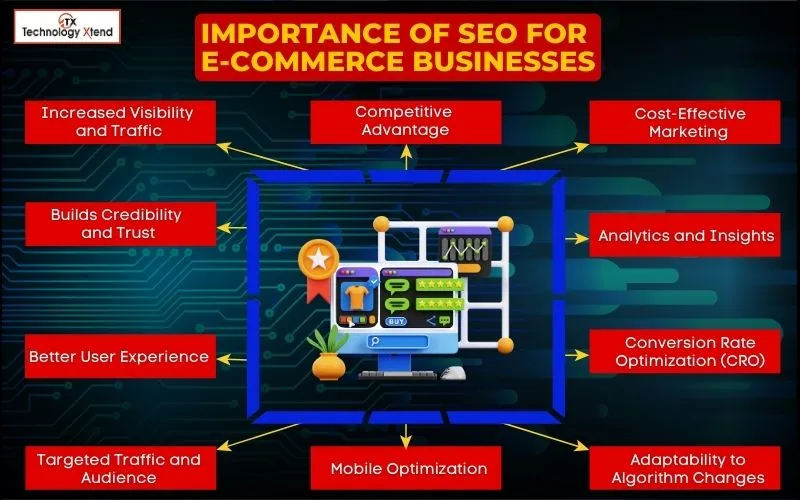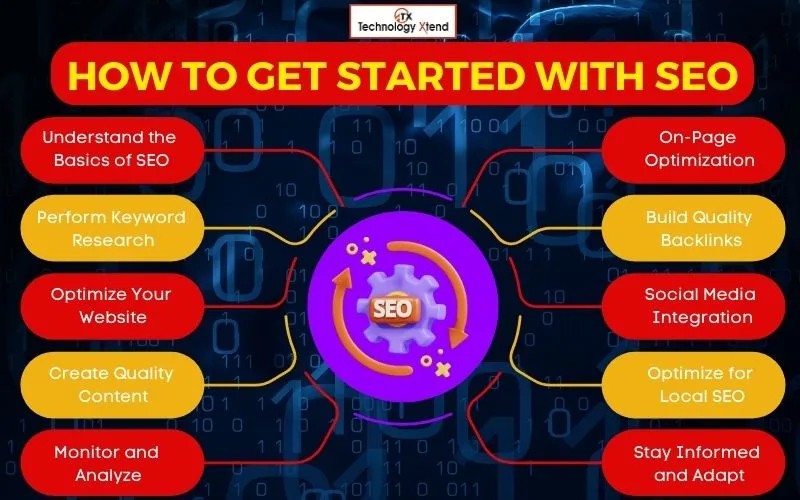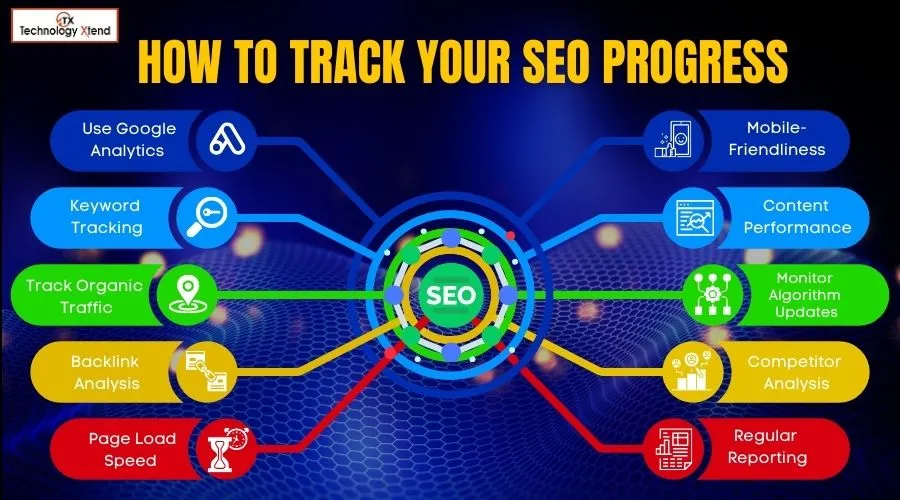
Technology XtendThe Must-Know SEO Strategies for e-commerce Businesses
Are you running an e-commerce business? Then you must know about SEO and how to use it to your advantage.
SEO, or search engine optimization, is a series of techniques used to improve the visibility and ranking of a website on search engines such as Google, Bing, and Yahoo. When done correctly, SEO can help bring more traffic and customers to your e-commerce website.
In this blog post, we will cover the basics of SEO for e-commerce businesses. We will start with a quick overview of what SEO is and why it's important. Then we will move on to some tips on how to get started with optimizing your website for search engines. Finally, we'll share some link building strategies that can help you boost your rankings even further.
What is SEO and Why Is It Important for E-commerce Businesses
» What is SEO -
SEO stands for “search engine optimization.” It is the act of enhancing a website's performance on Google search engines, aiming to increase the amount of traffic to the site and enhance its visibility.

There are two main types of SEO: on-page SEO and off-page SEO. On-page SEO refers to all the measures you can take to make your website more visible and attractive to Google. This includes things like optimizing your title tags, using relevant keywords, and creating quality content. Off-page SEO, on the other hand, refers to all the activities you can do outside of your website to promote it, such as link building and social media engagement.
Both on-page and off-page SEO are important for ecommerce businesses if they want to rank highly in search engine results pages (SERPs). However, because ecommerce sites have unique challenges and opportunities when it comes to optimization, they need to focus on certain strategies in order to be successful
» Benefits of SEO for E-commerce Businesses -
There are many benefits of investing in SEO for ecommerce businesses. Perhaps the most obvious one is that it can help increase web traffic levels by making your site more visible in search engine results pages. In addition, it can also lead to higher conversion rates since users who find your site through organic search are usually further along in their buyer’s journey and thus more likely to purchase something from you.
Other benefits of SEO include improved brand awareness (since your site will appear at the top of relevant searches), increased customer loyalty (since you’ll be providing them with what they’re looking for), and better ROI (since SEO is a long-term strategy with lasting effects).
How to Get Started with SEO
» Analyzing Your Website -
The first step to any successful SEO campaign is to analyze your website. This will help you understand where your site currently stands in terms of its search engine optimization, and what areas could use some improvement.

There are a few different ways to go about this. One is to use a website crawler, which will scan your site and generate a report detailing any issues it finds. Another option is to use a tool like Google Analytics, which can give you insights into how people are currently finding and using your site.
Either way, taking the time to do this analysis will give you a better understanding of where your site needs improvement and how best to approach your SEO campaign.
» Keyword Research -
Once you have a good understanding of your website and where it needs improvement, the next step is to start keyword research. This will involve figuring out what terms people are searching for that are related to your business or product. There are a number of different tools you can use for this, such as Google AdWords Keyword Planner or Moz Keyword Explorer. Once you have a list of potential keywords, you can start incorporating them into your site's content.
» Creating SEO-Optimized Content -
One of the most important aspects of any successful SEO campaign is creating high-quality, optimized content. This content should be well-written and informative, and it should incorporate the keywords you have researched in a natural way.
In addition to writing great content, there are a few other things you can do to optimize it for search engines. One is to make sure all of your images have alt tags that describe their contents; another is to create HTML sitemaps that help search engines index your pages more effectively.
By taking the time to create SEO-optimized content, you are giving your site a much better chance of ranking well in search results.
Link Building Strategies for E-commerce Businesses
» Guest Posts -
One great way to build links to your ecommerce site is through guest posting. This involves writing articles for other websites in your industry, with a link back to your own site included in the author byline or elsewhere in the article. To find opportunities for guest posting, you can search Google for terms like "write for us" + [your industry], or look for guest blogging guidelines on individual websites.
When pitching a guest post to another website, be sure to send them a well-written article that would be a good fit for their audience. Most importantly, make sure your article provides value and is not just a pitch for your own products or services. If you can provide helpful information and establish yourself as an expert in your field, you will be more likely to get accepted as a guest blogger and build valuable backlinks to your ecommerce site.
» Building Backlinks from Competitors
Another link building strategy that can be effective for ecommerce businesses is seeking out backlinks from competitor websites. To do this, you can use a tool like Moz's Open Site Explorer, which allows you to see which sites are linking to your competitors' pages. Once you have identified some potential link prospects, reach out and see if they would be interested in also linking to your site.
When reaching out to potential link partners, be sure to personalize your message and explain why it would benefit them to link to your ecommerce site. For example, you could point out that linking to your site would give their readers additional resources on the topic they are discussing. If you have high-quality content on your ecommerce site that would be relevant to their audience, mention this as well and include a link so they can check it out for themselves.
» Leveraging Social Media -
Social media platforms can also be leveraged as part of an ecommerce business' link building strategy. This involves sharing links to your website's content on social media platforms like Twitter, Facebook, and LinkedIn (among others), with the goal of getting people to click through and visit your site. In addition to helping drive traffic to your ecommerce site, this can also lead to valuable backlinks if people share or repost your content on their own social media accounts.
To maximize the impact of this strategy, it is important to create shareable content that is interesting and relevant to your target audience. For example, if you sell products related to gardening, you could write blog posts about tips for starting a garden, or share photos and videos of beautiful gardens from around the world. Whatever content you create, be sure to include links back to your ecommerce site so people can learn more about your products and services.
How to Track Your SEO Progress

» Measuring Organic Traffic -
There are a few key ways to measure the organic traffic coming to your eCommerce site from search engines. The first is through your web analytics program. Google Analytics is a free and popular option that provides insights into your website’s traffic. Look for trends in organic traffic over time, and compare this data to other metrics, such as conversion rate or goal completions, to see if there is a correlation.
Another way to measure organic traffic is through SERP (search engine results page) position tracking. This can be done manually, by keeping track of the keywords you rank for in search engines, or with the help of a tool like Moz’s Keyword Explorer. Look for changes in SERP position over time, and compare this data to other metrics, such as organic traffic or conversion rate, to see if there is a correlation.
» Monitoring Rankings -
In addition to measuring organic traffic, it is also important to monitor your rankings in search engines for the keywords you care about most. You can do this manually, by checking where you rank in search engines for different keywords on a regular basis, or you can use a tool like Moz’s Rank Tracker which will automate the process and make it easier to keep track of your progress over time. Monitoring your rankings is important because it gives you an indication of how well your SEO efforts are paying off. If you notice that your rankings are improving for certain keywords, it means that your SEO strategies are working and you should continue doing what you are doing. On the other hand, if you notice that your rankings are declining for certain keywords, it may be an indication that something needs to be changed in your SEO strategy.
» Other Metrics to Track -
In addition to measuring organic traffic and monitoring rankings, there are a few other key metrics that eCommerce businesses should track when it comes to their SEO efforts. These include click-through rate (CTR), dwell time, and bounce rate.
Click-through rate (CTR) measures how often people who see your listing in search results click on it. A high CTR indicates that people find your listing relevant and interesting, while a low CTR could mean that your listing is not relevant or not eye-catching enough. Dwell time measures how long people stay on your website after clicking through from search results; a high dwell time indicates that people find what they are looking for on your website while a low dwell time could indicate that they were not able to find what they're looking for or that they didn't find your website interesting enough to stay on it for very long. Finally, bounce rate measures how often people leave your website after only viewing one page; a high bounce rate could indicate that people didn't find what they were looking for on your website or that they found it difficult to navigate..
All three of these metrics - CTR ,dwell time ,and bounce rate - give insights into how well searchers interact with your website after finding it in search results and can be tracked using Google Analytics .
Conclusion
SEO is a complex and ever-changing field, but it is essential for any e-commerce business that wants to succeed online. While it can be difficult to get started with SEO, the effort is well worth it. By following the strategies outlined in this blog post, you can give your e-commerce business the best chance of ranking highly in search engine results and driving organic traffic to your website.
Related Articles









































